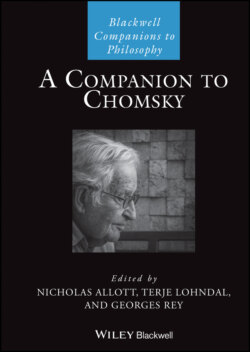Читать книгу A Companion to Chomsky - Группа авторов - Страница 22
References
Оглавление1 Allott, N., and G. Rey. 2017. The many errors of Vyvyan Evans' The Language Myth. The Linguistic Review 34 (3): 1–20.
2 Apperly, I. 2010. Mindreaders: The Cognitive Basis of “Theory of Mind.” Hove, East Sussex: Psychology Press.
3 Boeckx, C. 2006. Linguistic Minimalism: Origins, Concepts, Methods, and Aims. Oxford: Oxford University Press.
4 Brentano, F. 1874/1995. Psychology from an Empirical Standpoint. 2nd ed. London: Routledge.
5 Carey, S. 2009. Origin of Concepts. Oxford: Oxford University Press.
6 Chater, N., A. Clark, J. A. Goldsmith, and A. Perfors. 2015. Empiricism and Language Learnability. Oxford: Oxford University Press.
7 Chomsky, N. 1951. The Morphophonemics of Modern Hebrew. Master's thesis, University of Pennsylvania. (Published by Garland, New York, 1979.)
8 Chomsky, N. 1955. The Logical Structure of Linguistic Theory. Ms. Harvard University and MIT. Revised version published in part by Plenum, New York, 1975.
9 Chomsky, N. 1957. Syntactic Structures. The Hague: Mouton.
10 Chomsky, N. 1959. “Review of B. F. Skinner, ‘Verbal behavior.’” Language 35: 26–58.
11 Chomsky, N. 1962. “Explanatory models in linguistics.” In Logic, Methodology, and the Philosophy of Science, edited by E. Nagel, P. Suppes, and A. Tarski, 528–50. Stanford: Stanford University Press.
12 Chomsky, N. 1965. Aspects of the Theory of Syntax. Cambridge: MIT Press.
13 Chomsky, N. 1966. Cartesian Linguistics. New York: Harper and Row.
14 Chomsky, N. 1968/2006. Language and Mind. 3rd ed. Cambridge: Cambridge University Press.
15 Chomsky, N. 1975. Introduction to The Logical Structure of Linguistic Theory. New York: Plenum Press.
16 Chomsky, N. 1995a. Language and nature. Mind 104 (413): 1–61.
17 Chomsky, N. 1995b. The Minimalist Program. Cambridge: MIT Press.
18 Chomsky, N. 1996. Powers and Prospects. Boston: South End Press.
19 Chomsky, N. 2000. New Horizons in the Study of Language and Mind. Cambridge: Cambridge University Press.
20 Chomsky, N. 2010. The mysteries of nature: How deeply hidden? In Chomsky Notebook, edited by J. Bricmont, and J. Franck, 3–33. New York: Columbia University Press.
21 Chomsky, N. 2013a. Problems of projection. Lingua 130 33–49.
22 Chomsky, N. 2013b. What kind of creatures are we? Lecture I: What is language? The Journal Of Philosophy CX ( 12): 645–62.
23 Chomsky, N. 2015. Some core contested concepts. Journal of Psycholinguistic Research 44 (1): 91–104.
24 Chomsky, N., and M. Halle. 1968. The Sound Pattern of English. Cambridge: MIT Press.
25 Chomsky, N., and M‐P. Schützenberger. 1963. “The algebraic theory of context‐free languages.” In Computer Programming and Formal Systems, edited by B. Braffort and D. Hirschberg, 118–161. Amsterdam: North Holland.
26 Christiansen, M., and N. Chater. 2017. “Towards an integrated science of language.” Nature Human Behavior 1 (8): 0163.
27 Cohen, J., and J. Rogers. 1991. “Knowledge, morality and hope: The social thought of Noam Chomsky.” New Left Review 187: 5–27.
28 Collins, J. 2008. Chomsky : A Guide for the Perplexed. London: Continuum.
29 Cowie, F. 1999. What's Within: Nativism Re‐Considered. Oxford: Oxford University Press.
30 Evans, N., and S. C. Levinson. 2009. “The myth of language universals: language diversity and its importance for cognitive science.” Behavioral and Brain Sciences 32 (5): 429–448.
31 Evans, V. 2014. The Language Myth. Cambridge: Cambridge University Press.
32 Everett, D. 2012. Language: The Cultural Tool. New York: Pantheon Books.
33 Harris, Z. 1951. Methods in Structural Linguistics. Chicago: University of Chicago Press.
34 Lasnik, H., with Depiante, M. A. and A. Stepanov. 2000. Syntactic Structures Revisited : Contemporary Lectures on Classic Transformational Theory. Cambridge: MIT Press.
35 Lasnik, H., and T. Lohndal. 2013. “Brief overview of the history of generative grammar.” In The Cambridge Handbook of Generative Syntax, edited by M. den Dikken, 26–60. Cambridge: Cambridge University Press.
36 Mikhail, J. 2011. Elements of Moral Cognition: Rawls' Linguistic Analogy and the Cognitive Science of Moral and Legal Judgment. Cambridge: Cambridge University Press.
37 Miller, G. A. 2003. “The cognitive revolution: a historical perspective.” TRENDS in Cognitive Sciences 7 (3): 141–144.
38 Newmeyer, F. J. 1986. Has there been a ‘Chomskyan revolution’ in linguistics? Language 62 (1): 1–18.
39 Newmeyer, F. J. 1996. Generative Linguistics: A Historical Perspective. London: Routledge.
40 Pullum, G., and B. Scholz. 2002. Empirical assessment of stimulus poverty arguments. The Linguistic Review 19: 9–50.
41 Pustejovsky, J. 2016. Lexical semantics. In The Cambridge Handbook of Formal Semantics, edited by M. Aloni and P. J. E. Dekker, 33–64. Cambridge: Cambridge University Press.
42 Quine, W. 1960/2013. Word and Object. 2nd ed. Cambridge: MIT Press.
43 Sells, P. 1985. Lectures on Contemporary Syntactic Theories: An Introduction to Government‐Binding Theory, Generalized Phrase Structure Grammar, and Lexical‐Functional Grammar. Stanford: CSLI.
44 Skinner, B. F. 1957. Verbal Behavior. Acton, MA: Copley Publishing Group.
45 Spelke, E. 2003. Developing knowledge of space: Core systems and new combinations. In Languages of the Brain, edited by S. M. Kosslyn and A. Galaburda (eds.), 239–258. Cambridge, MA: Harvard University Press.
46 Tomasello, M. 2003. Constructing a Language: A Usage‐Based Theory of Language Acquisition. Cambridge, MA: Harvard University Press.
